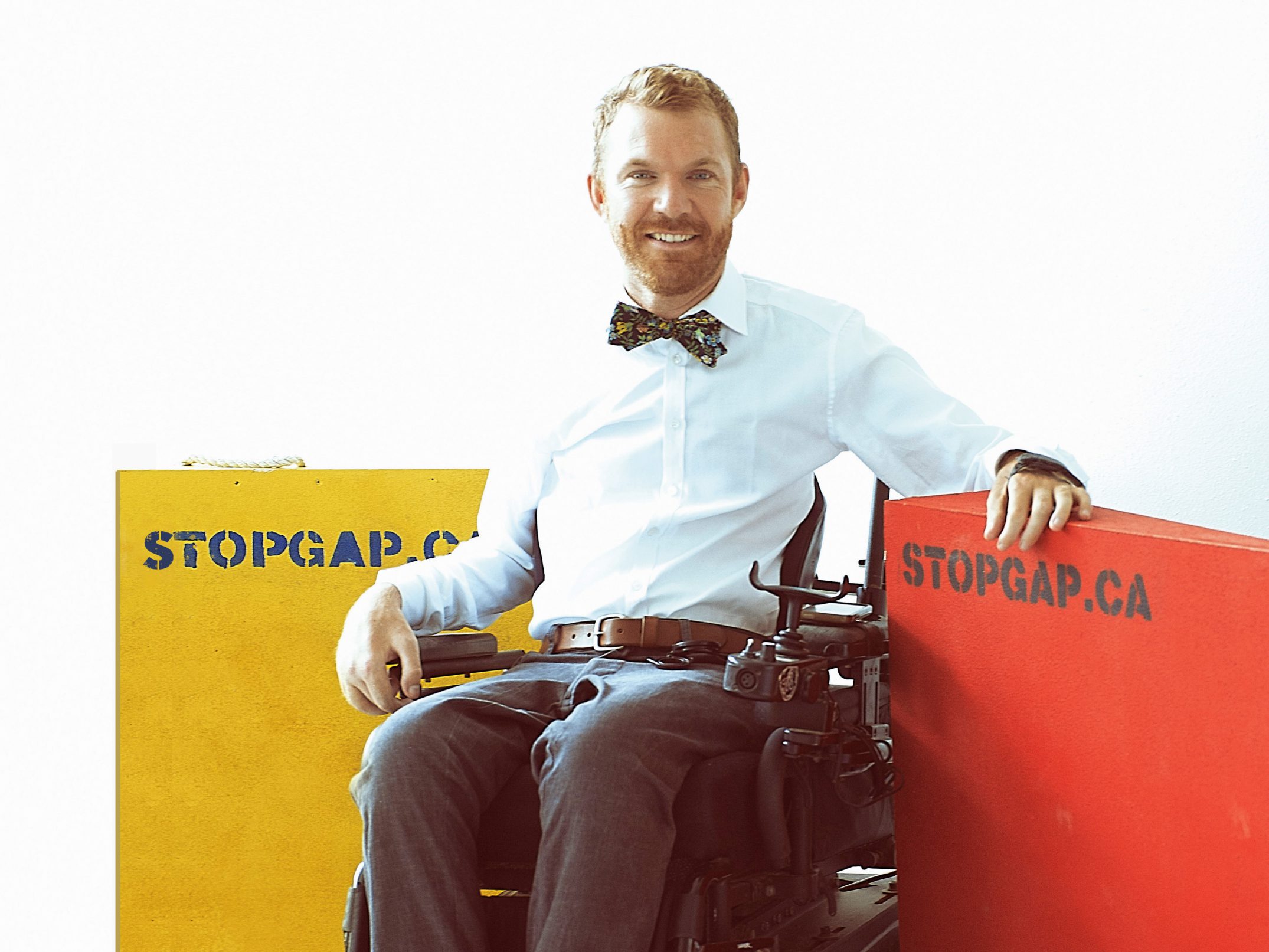Luke Anderson is an engineer and the co-founder of StopGap, a non-profit that builds brightly coloured ramps for businesses that have barriers to entry. Although accessibility is now his life’s work, Anderson didn’t begin considering accessible design until he sustained a spinal cord injury in a mountain biking accident in 2002.
“As an engineer, I have a passion for solving problems,” Anderson says. “Following my injury and needing to use a wheelchair to get around, there was this build up of frustration that inspired me to do something about this big issue.”
Starting with 12 ramps in Toronto’s Junction neighbourhood in 2011, StopGap has built hundreds of ramps for businesses in dozens of communities across Canada.
Disruption: “It’s really important to raise awareness through a disruptive measure, to stir the pot and to get people talking about it. We believe that our ramps are an amazing way to disrupt. They’re cost effective and easily replicable. They’re not intended to be a permanent solution. They’re intended to stop a barrier, but at the root of it all, it’s about getting people to talk about the issue by putting something really brightly coloured on the ground to draw attention.”
Barrier-free province: “In Ontario, we have the Accessibility for Ontarians with Disabilities Act that mandates the province be barrier-free by 2025. That’s great, but we have so far to go in such a short period of time to make that goal become a reality. On the TTC alone, just over half of the subway stations have elevators.”
Legal barriers: “Ramps aren’t allowed on city property because in most municipalities, encroachment bylaws prevent ramps from living on the boulevard. We have this really ambitious goal of becoming a barrier-free province, but unfortunately there are these antiquated policies in most municipalities across Canada that are restrictive and prevent equal access.”
More on Broadview: Disability rights activist works for government he sued
Universal design: “We’re all affected by inaccessible spaces. It’s inevitable at some point in our lives we’re all going to need to rely on a barrier-free amenity due to injury or illness or old age or occupation, or we become parents.”
Fear: “Disability is scary. It’s something that our society turns our heads at because it’s something that we fear and avoid. But the interesting thing that I enjoy contemplating is that we’ve all experienced disability. As babies, we did not have the ability to independently act on our own, we relied on other people for assistance. However, as we mature, we lose touch with that embodied experience. There’s some fear around that, and for good reason. To lose the ability to independently navigate your community is something that nobody wants, but I believe it’s not the person with the disability who is at fault, but it’s the way we’ve built our infrastructure that is to blame.”
COVID-19: “For many people who are self-isolating, ramps aren’t, at this time, a real necessity, and that really struck me. It’s forced me to think about where barriers exist in general. Yes, barriers exist in the built form that prevent people from being fully engaged in their communities, but I also believe there are barriers that exist within us that are embodied, such as stigma and fear, and the language we use. There’s disempowering antiquated language that is used when referring to people with disabilities. And those barriers live within us. After the dust settles, I’m interested in bringing education and resources to the table to get people talking about our inner barriers.”
A shorter version of this interview first appeared in Broadview’s July/August 2020 issue with the title “Luke Anderson.”
Isaac Würmann is a writer in Winnipeg.
I hope you found this article from Broadview engaging. The magazine and its forerunners have been publishing continuously since 1829. We face a crisis today like no other in our 191-year history and we need your help. Would you consider a one-time gift to see us through this emergency?
We’re working hard to keep producing the print and digital versions of Broadview. We’ve adjusted our editorial plans to focus on coverage of the social, ethical and spiritual elements of the pandemic. But we can only deliver Broadview’s award-winning journalism if we can pay our bills. A single tax-receiptable gift right now is literally a lifeline.
Things will get better — we’ve overcome adversity before. But until then, we really need your help. No matter how large or small, I’m extremely grateful for your support.
Jocelyn Bell
Editor/Publisher















